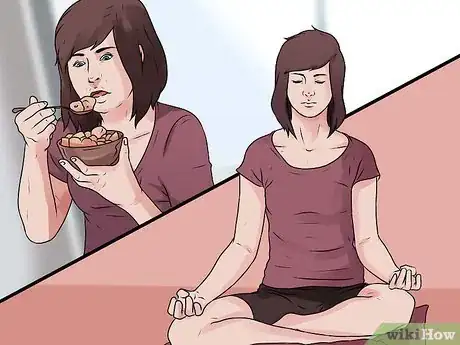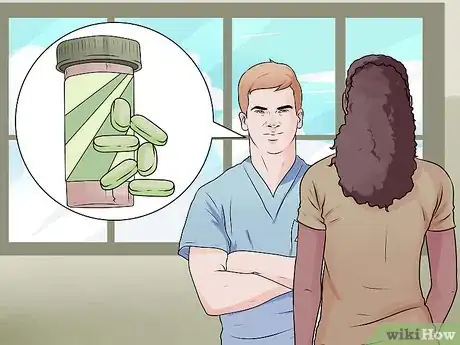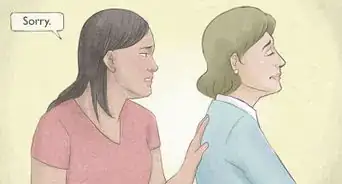This article was co-authored by Trudi Griffin, LPC, MS. Trudi Griffin is a Licensed Professional Counselor in Wisconsin specializing in Addictions and Mental Health. She provides therapy to people who struggle with addictions, mental health, and trauma in community health settings and private practice. She received her MS in Clinical Mental Health Counseling from Marquette University in 2011.
There are 24 references cited in this article, which can be found at the bottom of the page.
This article has been viewed 1,981,288 times.
A number of situations can arise throughout a lifetime that may cause a person to feel that their life sucks. This may include the loss of loved ones, the loss of a job, long-term unemployment, chronic illness, break-ups and divorces, and more. In all of these situations it is normal to feel low. Yet it is also important to realize that it is possible to rebound from these situations in time through positive thinking, that is by thinking about problems in a more optimistic and productive way.[1] In addition, there are a number of strategies you can consider to help return to happiness and to regain a positive view of life.
Steps
Identifying a Possible Cause
-
1Look for possible reasons why you think your life sucks. There are a variety of reasons why you may feel like your life sucks. If you experience a lot of daily stress, you may feel anxious or depressed. You may even have physical symptoms such as headaches or insomnia.[2] Common sources of stress include:[3]
- Major life changes. If you're going through a period of upheaval, such as getting out of a relationship (or getting into one), changing your job, moving to a new place, etc., you're probably experiencing stress. New situations and life changes aren't very easy to adjust to, but you will make it if you keep the faith and have a positive, hopeful attitude.
- Family. If your family life is in disarray, you may feel upset, sad, or anxious. Perhaps you have a dysfunctional family, suicidal parents or have to take care of an elderly or sick family member.
- Work/School. Work or school obligations are a huge source of stress for most people. If you feel unappreciated at work or school, or stuck at a dead-end job, you may feel like your life sucks.
- Social life. If you're feeling isolated or disconnected, you may feel like your life sucks. Or, if you feel anxious about meeting new people or hanging out in social situations, you may experience stress if you have to do these things.
-
2Keep a journal. One way to figure out a possible cause for your feelings is to identify when you feel them. Keeping a journal will also allow you to identify what elements of your situation you have control over, which will help you stay positive.[4] In general, you should remember that you cannot control anything other than your own actions and responses.
- For example, you might notice that you feel most upset and sad when you're at work. You may feel unacknowledged and unappreciated. You may feel overworked. This situation sucks.
- Ask yourself what elements you have control over. You can't control whether others appreciate or acknowledge your contributions. However, you might be able to be more assertive about owning your accomplishments. You can control whether you say "yes" to every project that crosses your desk. You can also control whether you look for a different job in a place that might be a better fit for you. Find ways to empower yourself, and you may find that you feel like your life sucks less.
- Try to come up with a list of things that you can do to help you own your situation. For example, if you feel overworked, you might consider talking to your boss about your workload or negotiating a pay raise. If you don't feel appreciated, you might consider looking for a job in a place with a better corporate environment. Make a list of specific, concrete actions that you can take.
Advertisement -
3Ask yourself the following questions to help analyze yourself. Are you suffering from a major illness? Do you abuse drugs and/or alcohol? Have there been any major events in your life recently? Have you recently experienced the death of a loved one? Do you have any personal conflicts? Do you have a history of abuse or trauma? Are you on any prescription medications?[5]
- If you answer yes to any of these questions, it could provide insights into why you think your life sucks.
-
4Consider possible biological causes. Many people are unable to figure out why they think that their life sucks.[6] Research has shown that genetics play a role in depression. If someone in your family suffers from depression, there is a chance you may as well.[7] Some medical conditions, such as underactive thyroid or chronic pain, can also cause depression.[8]
Decreasing Negativity and Increasing Positivity
-
1Recognize when you are thinking negatively. It is important to realize your negative thinking so that you can begin to change negativity into positivity. Negative thinkers tend to always anticipate the worst in a situation. In addition, they are quick to blame themselves for anything bad that has happened. Moreover, negative thinkers tend to magnify the negative aspects of any given situation. They also tend to polarize a situation, only seeing things as good or bad.[11]
-
2Change negative thinking into positive thinking. Try to check in on your thoughts regularly during the day. Identify what you normally think about in a negative way and put a positive spin on your thoughts. It also helps to surround yourself with positive people, as negative people can increase stress and increase your own negativity. Here are some examples of changing negative thoughts into positive thoughts:[12]
- This is scary, I've never done it before. = I have a great chance to do something different.
- I'll never get better at this. = Let me try this one more time.
- This is too big of a change. = Let's try something new and exciting.
-
3Try not to define yourself by your environment. It can feel like where you are in life defines who you are. If you're in an environment that sucks, it can be hard to remain positive. Focus on your innate qualities, rather than the situation around you. Remember: the situation is always temporary.
- For example, if you're worried about being unemployed, remember that your job status doesn't define you as a person. Consider this an opportunity to pursue a new direction, or search for meaningful work in another area, such as volunteering or focusing on your family.
- If you're feeling like your life sucks because you're being bullied, remember that bullies take their own insecurities out on others. Their actions only reflect on them, not on you. Inform the proper authorities, such as your parents, a counselor, or principal, and stay strong.
-
4Get out and be social again. Oftentimes people who feel that their life sucks will remove themselves from social contact. Ironically, this can be a further cause of depression. Take small steps to get yourself back into social circles again.[13]
- Try meeting a friend or family member for a brief coffee at first.
- Make more phone calls to friends and loved ones.
- Don't expect to enjoy it at first, or to be the star of a party. The key is baby steps back into a social life.
- Be friendly with strangers you meet throughout the day. Don't shy away from small talk. Talking with strangers can boost your happiness.
- Join a club or taking a class to meet new people.
-
5Try to think clearly. If you believe your life sucks, chances are that you are not thinking clearly and not responding to situations in a reasonable manner. Instead of letting your thoughts get out of control, return to clear thinking by asking yourself the following questions.
- How can I test if this idea is valid or not?
- Was this always true?
- Are there any exceptions?
- What is the missing part of the picture here?
-
6Exercise regularly and eat a healthy diet. Exercising three times a week has been shown to relieve mild to moderate depression. It will help you feel better about yourself, help you sleep better and can even improve mood. Eating a healthy diet is another way to help with depression. Limit your alcohol intake to one drink per day and eat a wide variety of healthy foods. You should also avoid drugs, smoking, and other habits that are detrimental to your health.
- Aerobic exercises are particularly effective. Try working out for 30 minutes on a treadmill, or going for a 30-minute walk.[14]
- Yoga may provide relief as well.
- Try eating fish, drinking plenty of fluids, whole grains and fruit.
-
7Try meditation and repeat a meaningful mantra. Repetitive messages, whether positive or negative, can have a big effect on the psyche. Replace all the noise with positivity by filling your mind with meaningful thoughts. Pick a mantra that helps you get through the day. Repeat it when you feel overwhelmed, and each time you do, think about what it really means.[15] Here are some examples.
- Be the change you wish to see. (Mahatma Gandhi)
- Action is the antidote to despair. (Joan Baez)
- None but ourselves can free our minds. (Bob Marley)
- It is better to light a candle than curse the darkness. (Eleanor Roosevelt)
-
8Figure out what life means to you. People who feel that life has a purpose tend to be happier than those who think it's meaningless. Have you ever taken time to think about the meaning of life? No one can truly know the answer to this universal question. However, you can decide what life means to you. Finding the meaning in your life will help you keep getting out of bed every day, even when things are at their worst.
- Some people find meaning by participating in a religion or nurturing their spiritual side.
- Learning more about philosophy might also help you figure out more about your personal worldview.
- On a more intimate scale, the most meaningful parts of your life might be your relationships, your work, your art, or something entirely different.
-
9Slow down to savor the good parts of life. There are bound to be a few things in your life that bring you comfort or peace. Whether it's drinking that first cup of coffee in the morning, walking to work in the sunshine or taking your ten-minute smoke break, savor the moment. Give yourself permission to slow down and enjoy the good things in life. You'll develop a healthy reserve of positive thoughts you can draw upon when things get bad.[16]
-
10Be helpful to others.[17] Even doing something as seemingly insignificant as carrying someone's groceries will give you a boost of positivity. Exerting more effort through volunteering will give you even better results. Figure out what you have to give, and share it generously as often as possible.
- Think you have nothing to offer? Find a homeless shelter in your area and volunteer for a few hours a week. You'll see that every bit of time you can spare is absolutely needed.
Seeking Help in Therapy or Medicine
-
1Research the techniques involved in cognitive therapy to see if it is for you. Much of the time you spend in cognitive therapy will involve tackling your real life problems.[18] A therapist will help you to examine and adjust your unproductive negative thoughts and behavior, and try to reduce the effect these thoughts and behaviors have upon you. You will work as a team with your therapist, making joint decisions about what will be discussed and what 'homework assignments' you receive.
- Cognitive therapy has been shown to be as effective as anti-depressants to improve mild to moderate depression.
- Cognitive therapy is as effective as anti-depressants in preventing relapses.
- The benefits of cognitive therapy often appear in weeks.
- Chose a cognitive behavioral therapist and book an appointment if this option appeals to you. Begin with an online search of therapists in your area, try the Association for Behavioral and Cognitive Therapies website.
-
2Research interpersonal therapy to see if it is for you. Interpersonal therapy is specifically for individuals with interpersonal issues. This is a short-term treatment option, typically lasting one hour per week for 12-16 weeks. Therapy sessions are specifically designed to help with interpersonal conflicts, changes in a person's social role, grief, and problems with developing social relationships.[19]
- The therapist will employ a number of techniques including empathetic listening, role-playing and communication analysis.
- Find an interpersonal therapist if you feel this is a good option for you. You can do an online search for an interpersonal therapist in your area. Psychology Today has a large directory.
-
3Research family therapy is to see if this is for you. A family therapist will focus on helping family members resolve conflicts with one another. The therapist will customize your sessions according to your problems, and any family member who is willing to participate will be welcomed. The therapist will examine your family's ability to solve problems, explore the roles that family members have, and will identify your family's strength and weaknesses as a unit.[20]
- Family therapy is particularly effective for individuals with marriage and family issues.
- Find a family therapist and book an appointment if this option appeals to you. Again you can begin your search online. The American Association for Marriage and Family Therapists is a valuable resource.
-
4Research acceptance and commitment therapy. This type of therapy is based upon the idea that greater well-being and happiness can be achieved by overcoming negative thoughts, feelings and associations. The therapist will work with you to change how you perceive negativity to help you see life in a more positive light.[21] [22]
- Find an acceptance and commitment therapist and book an appointment if this option appeals to you. Again you can begin your search online. The Association for Contextual Behavioral Science is a good place to start.[23]
-
5Pay close attention when choosing a therapist. You will want to examine their training and qualifications. You will also want to pay attention to any potential fees and whether they accept any insurance you may have. You should also ask about how the therapist usually sees patients.
- Find out if the therapist is certified in your state, and if they are certified in the specialty you are seeking.
- Ask how much the therapist charges per session, if they charge according to your income and if there is a charge for the first visit (there may or may not be).
- Ask how often you will see the therapist (once a week or more frequently), how long the sessions are, and if there are any limitations on confidentiality.
-
6Seek help from your physician if none of the other methods have made you feel more positive. Feelings of depression can be very difficult to overcome, and many people seek out advice from their physicians regarding the solutions they can offer. If you have a primary care physician, he or she should be your first call. If not, find a primary care physician online and book an appointment to discuss your issues.
-
7Know what to expect at the doctor's appointment. People typically associate the doctor's office with blood tests and sending samples to the lab, but this is not the case in diagnosing depression as lab work will not help to reveal depression. Instead, your doctor will do a physical evaluation and a personal interview to determine if are suffering from depression.[24] The doctor will be assessing the following.
- Sadness or depressed mood.
- Change in weight.
- Fatigue.
- Insomnia.
- Thoughts of death or suicidal thoughts.
- Lab work may be used by the doctor to rule out physical causes for depression.
-
8Expect your doctor to prescribe medicine to help with your depression. It is likely that your doctor will recommend therapy to help with your depression. However, there are a number of medicines that can significantly help with depression as well. If your doctor prescribes any of these medicines, be such to follow his or her advice exactly. Anti-depressants should only be taken exactly how a doctor prescribes them.
- Some medicines prescribed for depression include Paxil, Lexapro, Zoloft and Prozac. Different medications work differently for different people, but thee medicines will usually take full effect in approximately one month.[25]
Warnings
- When feeling depressed, avoid the use of drug and alcohol. Substance abuse can easily become a crutch and this can lead to lifelong addiction problems.⧼thumbs_response⧽
- If you need immediate help and feel you might be at risk for suicide, contact a suicide prevention hotline by calling or texting 988 if you're in the United States.[27] If you aren't in the United States, call your country's suicide prevention hotline.⧼thumbs_response⧽
References
- ↑ http://www.mayoclinic.org/healthy-living/stress-management/in-depth/positive-thinking/art-20043950
- ↑ http://www.mayoclinic.org/healthy-lifestyle/stress-management/in-depth/stress-management/art-20044151?pg=1
- ↑ http://www.mayoclinic.org/healthy-lifestyle/stress-management/in-depth/stress-management/art-20044151?pg=2
- ↑ http://psychcentral.com/lib/the-health-benefits-of-journaling/
- ↑ https://www.nimh.nih.gov/health/topics/depression/index.shtml#part_145395
- ↑ http://www.health.harvard.edu/mind-and-mood/what-causes-depression
- ↑ https://www.nimh.nih.gov/health/topics/depression/index.shtml#part_145395
- ↑ https://www.nlm.nih.gov/medlineplus/ency/article/000945.htm
- ↑ http://www.nimh.nih.gov/health/publications/depression-in-women/index.shtml
- ↑ https://www.psychologytoday.com/us/basics/depression/causes-depression
- ↑ https://www.ncbi.nlm.nih.gov/pmc/articles/PMC2899011/
- ↑ http://www.mayoclinic.org/healthy-living/stress-management/in-depth/positive-thinking/art-20043950
- ↑ https://www.ncbi.nlm.nih.gov/pmc/articles/PMC2860146/
- ↑ https://www.ncbi.nlm.nih.gov/pmc/articles/PMC6955623/
- ↑ https://books.google.com/books?id=ckwZ-C34-wgC&pg=PA168&lpg=PA168&dq=repeating+a+mantra+and+depression&source=bl&ots=BlE_CuXbvp&sig=0xlV5kh8tgztq3-YB6ZPAeMtu2Y&hl=en&sa=X&ved=0CC8Q6AEwAmoVChMI29OV6tXbyAIVyT0-Ch1w9Q89#v=onepage&q=repeating%20a%20mantra%20and%20depression&f=false
- ↑ http://www.mentalhealthamerica.net/stay-positive
- ↑ http://money.usnews.com/money/personal-finance/articles/2012/04/04/why-helping-others-makes-us-happy
- ↑ http://www.mirecc.va.gov/visn16/docs/therapists_guide_to_brief_cbtmanual.pdf
- ↑ https://www.psychologytoday.com/us/therapy-types/interpersonal-psychotherapy
- ↑ https://www.ncbi.nlm.nih.gov/pmc/articles/PMC6769152/
- ↑ https://www.psychologytoday.com/blog/two-takes-depression/201102/acceptance-and-commitment-therapy
- ↑ http://eric.ed.gov/?id=EJ844315
- ↑ https://contextualscience.org/civicrm/profile?gid=17&reset=1&force=1
- ↑ https://www.mind.org.uk/information-support/guides-to-support-and-services/seeking-help-for-a-mental-health-problem/what-might-happen-at-a-gp-appointment/
- ↑ https://www.nhs.uk/mental-health/conditions/clinical-depression/treatment/
- ↑ https://988lifeline.org/
- ↑ https://988lifeline.org/
About This Article
There are all kinds of things that can make you feel like your life sucks, but you can rebound from these situations by staying positive. Staying positive isn't always easy, but taking baby steps can help. Spend time with your friends and family, exercise and eat healthy, and find activities that you really enjoy. You might have to fake it at first, but things will get easier over time. If you can't do it on your own, that's okay. Consider talking to a professional, like your doctor or a therapist. There are a ton of different treatments out there that can help with whatever issues you're dealing with, like cognitive behavioral therapy and medication. To learn how to stay positive by helping others, keep reading.





















































































Medical Disclaimer
The content of this article is not intended to be a substitute for professional medical advice, examination, diagnosis, or treatment. You should always contact your doctor or other qualified healthcare professional before starting, changing, or stopping any kind of health treatment.
Read More...